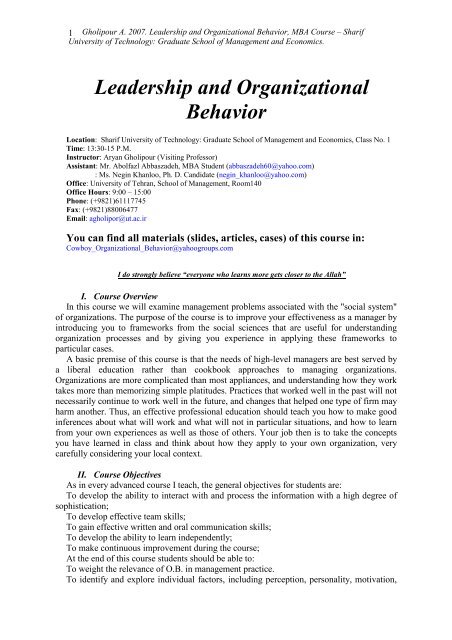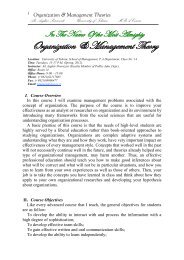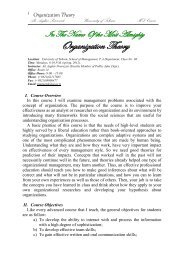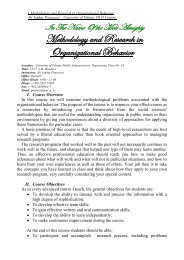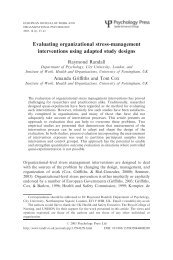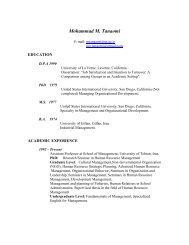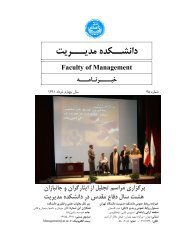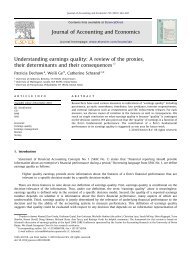Leadership and Organizational Behavior
Leadership and Organizational Behavior
Leadership and Organizational Behavior
Create successful ePaper yourself
Turn your PDF publications into a flip-book with our unique Google optimized e-Paper software.
1 Gholipour A. 2007. <strong>Leadership</strong> <strong>and</strong> <strong>Organizational</strong> <strong>Behavior</strong>, MBA Course – Sharif<br />
University of Technology: Graduate School of Management <strong>and</strong> Economics.<br />
<strong>Leadership</strong> <strong>and</strong> <strong>Organizational</strong><br />
<strong>Behavior</strong><br />
Location: Sharif University of Technology: Graduate School of Management <strong>and</strong> Economics, Class No. 1<br />
Time: 13:30-15 P.M.<br />
Instructor: Aryan Gholipour (Visiting Professor)<br />
Assistant: Mr. Abolfazl Abbaszadeh, MBA Student (abbaszadeh60@yahoo.com)<br />
: Ms. Negin Khanloo, Ph. D. C<strong>and</strong>idate (negin_khanloo@yahoo.com)<br />
Office: University of Tehran, School of Management, Room140<br />
Office Hours: 9:00 – 15:00<br />
Phone: (+9821)61117745<br />
Fax: (+9821)88006477<br />
Email: agholipor@ut.ac.ir<br />
You can find all materials (slides, articles, cases) of this course in:<br />
Cowboy_<strong>Organizational</strong>_<strong>Behavior</strong>@yahoogroups.com<br />
I do strongly believe “everyone who learns more gets closer to the Allah”<br />
I. Course Overview<br />
In this course we will examine management problems associated with the "social system"<br />
of organizations. The purpose of the course is to improve your effectiveness as a manager by<br />
introducing you to frameworks from the social sciences that are useful for underst<strong>and</strong>ing<br />
organization processes <strong>and</strong> by giving you experience in applying these frameworks to<br />
particular cases.<br />
A basic premise of this course is that the needs of high-level managers are best served by<br />
a liberal education rather than cookbook approaches to managing organizations.<br />
Organizations are more complicated than most appliances, <strong>and</strong> underst<strong>and</strong>ing how they work<br />
takes more than memorizing simple platitudes. Practices that worked well in the past will not<br />
necessarily continue to work well in the future, <strong>and</strong> changes that helped one type of firm may<br />
harm another. Thus, an effective professional education should teach you how to make good<br />
inferences about what will work <strong>and</strong> what will not in particular situations, <strong>and</strong> how to learn<br />
from your own experiences as well as those of others. Your job then is to take the concepts<br />
you have learned in class <strong>and</strong> think about how they apply to your own organization, very<br />
carefully considering your local context.<br />
II. Course Objectives<br />
As in every advanced course I teach, the general objectives for students are:<br />
To develop the ability to interact with <strong>and</strong> process the information with a high degree of<br />
sophistication;<br />
To develop effective team skills;<br />
To gain effective written <strong>and</strong> oral communication skills;<br />
To develop the ability to learn independently;<br />
To make continuous improvement during the course;<br />
At the end of this course students should be able to:<br />
To weight the relevance of O.B. in management practice.<br />
To identify <strong>and</strong> explore individual factors, including perception, personality, motivation,
2 Gholipour A. 2007. <strong>Leadership</strong> <strong>and</strong> <strong>Organizational</strong> <strong>Behavior</strong>, MBA Course – Sharif<br />
University of Technology: Graduate School of Management <strong>and</strong> Economics.<br />
emotions, attitudes, self-awareness, culture, <strong>and</strong> diversity, which may influence individual<br />
<strong>and</strong> group behavior in organizations.<br />
To point out <strong>and</strong> discuss how certain organizational processes, involving leadership,<br />
decision-making, communication, <strong>and</strong> change, may influence individual <strong>and</strong> group behavior.<br />
To identify <strong>and</strong> analyze personal biases <strong>and</strong> how they may impact individual <strong>and</strong> group<br />
behavior in organizations.<br />
To apply analytical <strong>and</strong> problem-solving skills in the application of organizational<br />
behavior knowledge to work-related conflicts, opportunities, <strong>and</strong> challenges.<br />
To identify managerial principles that may favorably influence organizational<br />
commitment, job performance, job satisfaction, <strong>and</strong> other desirable individual, group, <strong>and</strong><br />
organizational outcomes.<br />
To underst<strong>and</strong> the nature, scope <strong>and</strong> historical literature of O.B;<br />
To underst<strong>and</strong> the variety of academic disciplines that have contributed to the theories <strong>and</strong><br />
practices of O.B;<br />
To see, underst<strong>and</strong> <strong>and</strong> appreciate theories, facts, events, issues, problems, <strong>and</strong> alternative<br />
solutions from more than a single perspective;<br />
III. Required Texts<br />
1. Robbins, S. P. 2005. <strong>Organizational</strong> <strong>Behavior</strong>, Pearson: Prentice Hall.<br />
2. Kreitner, R., Kinicki, A. 2004. <strong>Organizational</strong> behavior. 6 th ed., Boston, MA:<br />
McGraw-Hill.<br />
3 . Luthans, F. 2005. <strong>Organizational</strong> <strong>Behavior</strong>. 10 th ed. McGraw-Hill.<br />
4. McShane Steven, Mary Ann Von Glinow. 2005. <strong>Organizational</strong> <strong>Behavior</strong> 4th<br />
Edition, McGraw-Hill.<br />
IV.<br />
Procedures <strong>and</strong> Expectations<br />
1. I expect students to complete assigned readings on time <strong>and</strong> to come to class<br />
prepared to discuss them. Participation in class discussions is encouraged <strong>and</strong><br />
expected. Students are encouraged to speak out in class to ask questions <strong>and</strong><br />
express ideas <strong>and</strong> opinions.<br />
2. Classroom Etiquette: While we disagree with other’s ideas, we should respect to<br />
them <strong>and</strong> appreciate our common bond of human dignity. In order to have a<br />
positive <strong>and</strong> safe learning environment, we as a class will have to agree to<br />
disagree at times. Some of us may have strong feelings <strong>and</strong>/or reactions to class<br />
materials, readings, etc. Expressing these reactions is encouraged as long as this<br />
is done in a respectful manner. Hostile <strong>and</strong>/or disrespectful behavior is not<br />
allowed. In addition, we must be watchful to not take up too much “airtime” <strong>and</strong><br />
allow for everyone to share. Talking a lot is generally not a good way of actively<br />
participating. Instead, carefully listening to others <strong>and</strong> clearly <strong>and</strong> concisely<br />
expressing your input is the best strategy. Remember to address each other when<br />
talking rather than directing your comments to me unless they are solely intended<br />
for me.<br />
3 . Class attendance is required throughout the semester <strong>and</strong> on-time attendance is<br />
considered m<strong>and</strong>atory. Coming to class late is a disruption to all members of the<br />
class<br />
4. Communication: Please come <strong>and</strong> visit me during office hours. I am there<br />
waiting for you to discuss readings, lecture, grading, exams, classroom behaviors,<br />
sociology, etc. If you cannot come to scheduled office hours, please let me know<br />
<strong>and</strong> we will work something else out. The best way to reach me is through e-
3 Gholipour A. 2007. <strong>Leadership</strong> <strong>and</strong> <strong>Organizational</strong> <strong>Behavior</strong>, MBA Course – Sharif<br />
University of Technology: Graduate School of Management <strong>and</strong> Economics.<br />
mail. I will communicate with the class through email. I expect each of you to<br />
check email on a daily basis.<br />
5. Academic Ethics: Dishonesty <strong>and</strong> cheating of any kind will NOT be tolerated.<br />
Plagiarism is a particular form of dishonesty that presents the work, ideas, or<br />
words of another without attribution as if they were your own. It applies to<br />
various tasks, including assignments <strong>and</strong> papers. When doing written work it is<br />
important to cite the original author when your ideas have been developed in<br />
previously published work.<br />
6. Students must TURN OFF cell phones <strong>and</strong> beepers while in class.<br />
7. Students should not bring guests to class unless approved by the instructor.<br />
8. Students should not disrupt class in any manner. Conversations during class time<br />
among two or a few students, in contrast to the class as a whole, should be kept to<br />
an absolute minimum as they are disruptive to the attention of the class.<br />
9. Except under unusual circumstances, assignment grades will be reduced if they<br />
are not h<strong>and</strong>ed over on time. Assignments are due at the beginning of class on the<br />
date indicated. Any assignment turned in after this time is considered late. Late<br />
assignments will receive a 20 percent reduction in points awarded.<br />
10. All assignments <strong>and</strong> examinations must be typed or generated by a word<br />
processor. H<strong>and</strong>written assignments will NOT be accepted.<br />
11. Exams will be in descriptive way. Material covered in the exams will come from<br />
lectures, in-class discussions, <strong>and</strong> assigned readings. Every effort should be made<br />
to attend class on exam day. If an emergency arises, a make-up date may be<br />
established. Note that the content of make-up exam will be substantially different<br />
than the content of the usual exam.<br />
12. Unannounced quizzes may be given at any time. These quizzes will be over<br />
material covered in previously assigned readings or covered in lectures <strong>and</strong> will<br />
be extremely short. Quizzes are used at the discretion of the instructor <strong>and</strong> only<br />
students present in class are eligible to take the quiz. There are no makeup<br />
quizzes.<br />
13. The instructor reserves the right to amend <strong>and</strong>/or change class policies <strong>and</strong><br />
procedures.<br />
14. The instructor shall strive to assign grades that are reasonable, accurate<br />
reflections of student performance <strong>and</strong> fair to other students. The final grade will<br />
be allocated between these assignments as follows:<br />
Participation/Attendance 2<br />
Quizzes 2<br />
Group Paper 7<br />
Case Analysis 4<br />
Exam 5<br />
Total 20<br />
V. Course Outline <strong>and</strong> Schedule<br />
Week 1:<br />
Topics: Course Introduction, The Evolution of O.B Thoughts <strong>and</strong> paradigms<br />
Week 2:<br />
Topic: Motivation: Theories <strong>and</strong> Applications<br />
Week 3:<br />
Topics: Perception <strong>and</strong> Decision Making<br />
Week 4:
4 Gholipour A. 2007. <strong>Leadership</strong> <strong>and</strong> <strong>Organizational</strong> <strong>Behavior</strong>, MBA Course – Sharif<br />
University of Technology: Graduate School of Management <strong>and</strong> Economics.<br />
Topics: Personality, Values, Attitudes <strong>and</strong> Emotions<br />
Week 5:<br />
Topic: Learning <strong>and</strong> <strong>Behavior</strong> Modification<br />
Week 6:<br />
Topic: Stress Management<br />
Week 7:<br />
Topics: Group Dynamics <strong>and</strong> Teams<br />
Week 8:<br />
Topics: Power, Influence, Empowerment <strong>and</strong> Politics<br />
Week 9:<br />
Topic: <strong>Organizational</strong> Communication<br />
Week 10:<br />
Topics: Conflict <strong>and</strong> Negotiation<br />
Week 11:<br />
Topic: <strong>Organizational</strong> Culture<br />
Week 12:<br />
Topic: <strong>Leadership</strong><br />
Week 13:<br />
Topic: Sociology of <strong>Organizational</strong> <strong>Behavior</strong>: Critical Review<br />
Week 14,15,16:<br />
Paper Presentations<br />
Week 17:<br />
Exam 2<br />
VI. Guidelines for Papers<br />
Topics: The paper topics should be drawn from any of the O.B areas lectured on in the<br />
class. You may also choose an O.B issue that has not been directly addressed in class, but it<br />
should be related to issues that had been discussed <strong>and</strong> analyzed.<br />
- The paper will be presented in class.<br />
- Students are to work in groups of no larger than four.<br />
Papers: Write-ups should be about 7to 10 pages long (Microsoft Word, Single-spaced,<br />
Font: Zar, Font Size:14, Line Spacing: Single, one inch margins). A good write-up would<br />
describe the issue, analyze the problems faced, <strong>and</strong> discuss previous proposals that have been<br />
made. Justify your conclusions <strong>and</strong> clearly discuss your recommendation(s). Succinctness<br />
will be rewarded. The papers will be due on the day the in-class presentations are made.<br />
VII. Citation Style for Papers<br />
Embed the reference in the text with the form (author last name, year: page) .".."<br />
(Gholipour,2005:23).<br />
If the same author has more than one reference in a given year append a letter - a,b,c, - to<br />
the year. (Gholipour, 2005a; Gholipour, 2005b).<br />
You need a bibliography at the end of the paper that gives the full citation for each<br />
reference. The bibliography should be alphabetical by author last name. It takes the form:<br />
For a journal article:<br />
Author last name, first name .year. "Article Title," Journal Name. Vol. No. Pages.<br />
Example:<br />
Gholipour, A. 1381. "The Sociology of Public Administration," Management<br />
Knowledge.15/57:51-70.<br />
For a book:<br />
Author last name, first name .year. Book Title .Publishing City: Publisher.<br />
Example:<br />
Gholipour, A.1380. The Sociology of Organizations. Tehran: Samt.
5 Gholipour A. 2007. <strong>Leadership</strong> <strong>and</strong> <strong>Organizational</strong> <strong>Behavior</strong>, MBA Course – Sharif<br />
University of Technology: Graduate School of Management <strong>and</strong> Economics.<br />
For material in an edited book:<br />
Author last name, first name .year of edited book publication. "Chapter Title," Pages. In<br />
Author(s) of edited volume, ed. Title of Book .Publishing City: Publisher.<br />
Example:<br />
Scott, Richard W .1991. "Institutions," 97 – 111 In Powell, W.W. & DiMaggio, P.J. The<br />
New Institutionalism in <strong>Organizational</strong> Analysis. Chicago: University of Chicago Press.<br />
VIII. Suggested Topics for Papers:<br />
Workaholism, Religion <strong>and</strong> Spirituality in Workplace, Language of Organization, Cross-Cultural<br />
Management, Diversity, Empowerment, Dysfunctional Organizations, Emotional Intelligence, Impression<br />
Management, <strong>Organizational</strong> Citizenship <strong>Behavior</strong>, Pay-for-Performance, Self-Directed Work Teams,<br />
Technology <strong>and</strong> <strong>Organizational</strong> <strong>Behavior</strong>, Top-Management Teams, Transformational <strong>Leadership</strong>, Virtual<br />
Teams. Perception <strong>and</strong> its impact on communication, Power <strong>and</strong> politics in organizations: <strong>Behavior</strong>al<br />
implications, Conflicts in organizational life: Challenges <strong>and</strong> strategies, The relationship between job<br />
satisfaction <strong>and</strong> job performance, Silence as communication, Culture <strong>and</strong> leadership, Interpersonal Skills <strong>and</strong><br />
Managerial Roles, The Psychological Contract, The Role of Non-work Activities in Work <strong>Behavior</strong>, Ethical<br />
Issues in Managing Employee <strong>Behavior</strong>, Conceptualizing <strong>Organizational</strong> Culture, The Adult Life Cycle <strong>and</strong><br />
Career Planning, The Current State of Participative Management in Practice, Socio-technical Systems:<br />
Integrating People <strong>and</strong> Machines, Cognitive Dissonances Place in <strong>Organizational</strong> <strong>Behavior</strong>, Methods for<br />
Overcoming Resistance to Change, Incentives <strong>and</strong> Gain-sharing, Money as a Motivator, Motivating<br />
Professional vs. Blue-Collars: Is There Really a Difference?, Differences between Male <strong>and</strong> Female <strong>Leadership</strong><br />
Styles, Non-Verbal Communication, The Impact of Changing Attitudes toward Work, Work as a Central-Life<br />
Interest.<br />
IX.<br />
Suggested Journals for Papers:<br />
ACADEMY OF MANAGEMENT EXECUTIVE<br />
ACADEMY OF MANAGEMENT JOURNAL<br />
ACADEMY OF MANAGEMENT REVIEW<br />
ADMINISTRATION AND SOCIETY<br />
ADMINISTRATIVE MANAGEMENT<br />
ADMINISTRATIVE SCIENCE QUARTERLY<br />
AMERICAN REVIEW OF PUBLIC ADMINISTRATION<br />
AUSTRALIAN JOURNAL OF PUBLIC ADMINISTRATION<br />
BEHAVIOR AND PHILOSOPHY<br />
BEHAVIOR MODIFICATION<br />
BEHAVIOR THERAPY<br />
BEHAVIORAL SCIENCE<br />
BRITISH JOURNAL OF MANAGEMENT<br />
BUSINESS COMMUNICATIONS REVIEW<br />
BUSINESS ETHICS QUARTERLY<br />
BUSINESS HISTORY<br />
BUSINESS HISTORY REVIEW<br />
BUSINESS HORIZONS<br />
CALIFORNIA MANAGEMENT REVIEW<br />
CANADIAN JOURNAL OF ADMINISTRATIVE SCIENCES<br />
CANADIAN PUBLIC ADMINISTRATION<br />
CLINICAL LEADERSHIP & MANAGEMENT REVIEW<br />
COMPUTERS IN HUMAN BEHAVIOR<br />
CONFLICT MANAGEMENT AND PEACE SCIENCE<br />
EDUCATIONAL ADMINISTRATION QUARTERLY<br />
ENVIRONMENT AND BEHAVIOR<br />
GENDER WORK AND ORGANIZATION<br />
GROUP & ORGANIZATION MANAGEMENT<br />
HARVARD BUSINESS REVIEW<br />
HUMAN ORGANIZATION<br />
HUMAN RELATIONS<br />
HUMAN RESOURCE MANAGEMENT<br />
HUMAN SERVICES AND MANAGEMENT<br />
INTERNATIONAL JOURNAL OF CONFLICT MANAGEMENT<br />
INTERNATIONAL JOURNAL OF HUMAN RESOURCE<br />
MANAGEMENT<br />
INTERNATIONAL JOURNAL OF MANAGEMENT REVIEWS<br />
JOURNAL OF APPLIED BEHAVIOR AL SCIENCE<br />
JOURNAL OF APPLIED PSYCHOLOGY<br />
JOURNAL OF BEHAVIOR THERAPY AND EXPERIMENTAL<br />
PSYCHIATRY<br />
JOURNAL OF BUSINESS AND PSYCHOLOGY<br />
JOURNAL OF BUSINESS AND TECHNICAL COMMUNICATION<br />
JOURNAL OF BUSINESS ETHICS<br />
JOURNAL OF MANAGEMENT<br />
JOURNAL OF MANAGEMENT IN ENGINEERING<br />
JOURNAL OF MANAGEMENT INQUIRY<br />
JOURNAL OF MANAGEMENT STUDIES<br />
JOURNAL OF MARKETING COMMUNICATIONS<br />
JOURNAL OF MARKETING RESEARCH<br />
JOURNAL OF ORGANIZATIONAL BEHAVIOR<br />
JOURNAL OF ORGANIZATIONAL BEHAVIOR MANAGEMENT<br />
JOURNAL OF PERSONALITY AND SOCIAL PSYCHOLOGY<br />
JOURNAL OF PUBLIC ADMINISTRATION RESEARCH AND<br />
THEORY<br />
JOURNAL OF SPORT MANAGEMENT<br />
JOURNAL OF STRATEGIC STUDIES<br />
JOURNAL OF VOCATIONAL BEHAVIOR<br />
LEADERSHIP QUARTERLY<br />
MANAGEMENT LEARNING<br />
MANAGEMENT SCIENCE<br />
MIT SLOAN MANAGEMENT REVIEW<br />
ORGANIZATION STUDIES<br />
ORGANIZATIONAL BEHAVIOR AND HUMAN DECISION<br />
PROCESSES<br />
ORGANIZATIONAL DYNAMICS<br />
PERSONNEL JOURNAL<br />
PERSONNEL PSYCHOLOGY<br />
PSYCHOLOGICAL BULLETIN<br />
PSYCHOLOGY & MARKETING<br />
PSYCHOLOGY PUBLIC POLICY AND LAW<br />
PUBLIC ADMINISTRATION REVIEW<br />
PUBLIC PERSONNEL REVIEW<br />
RESEARCH IN ORGANIZATIONAL BEHAVIOR<br />
SLOAN MANAGEMENT REVIEW<br />
TOTAL QUALITY MANAGEMENT & BUSINESS EXCELLENCE<br />
This course is delivered in the framework of "Official Educational Rules for<br />
Graduate Programs in Sharif University of Technology".


